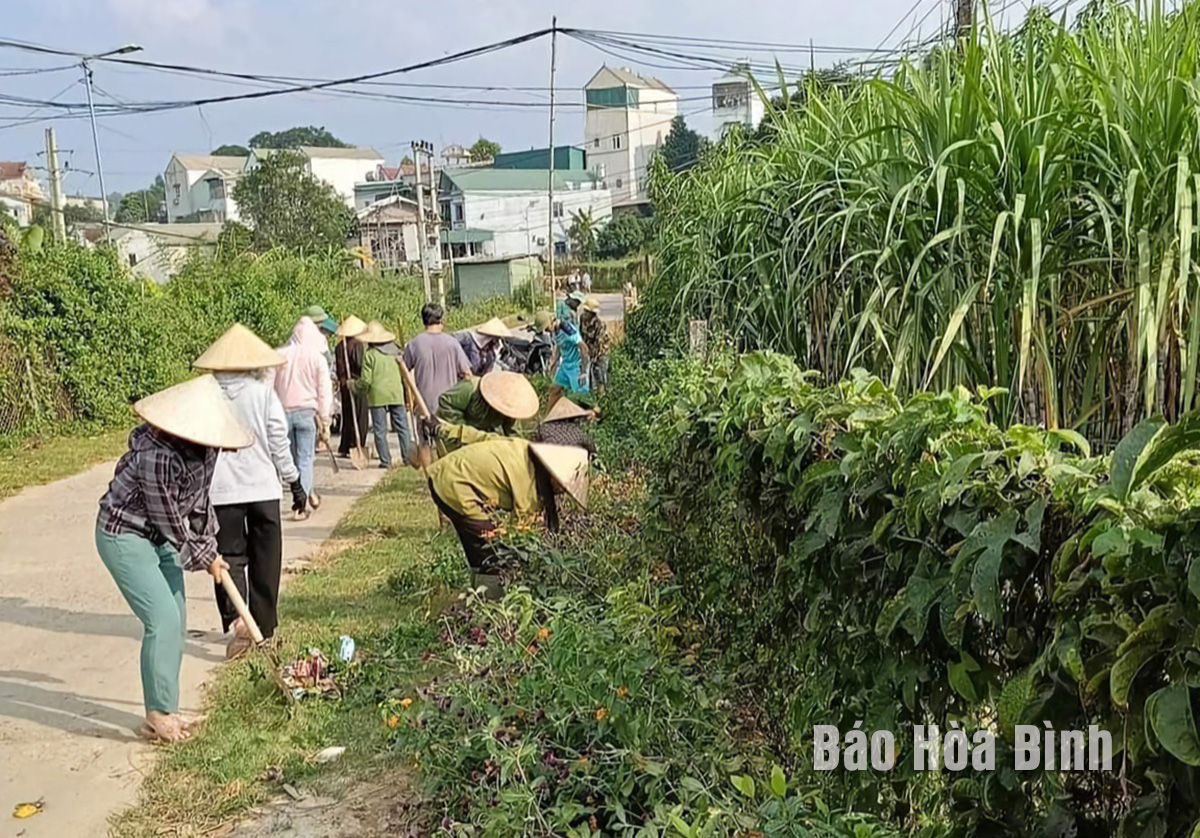
Cao Phong district achieved positive socio-economic development results last year as drastic comprehensive measures were implemented with high determination of its whole political system, said the Secretary of the district Party Committee Ha Van Di.
People in Bac Phong commune, Cao Phong district, join a clean-up
at their residential area.
In particular, its budget revenue reached 602
billion VND (24.3 million USD), its poverty rate fell to 4.81%, and seven out
of the nine communes in the district were recognised as new-style rural areas.
The district's political security and social safety and order were ensured.
Last year, the district’s Party organisation had
106 new members, ten out of its 49 Party units had excellent performance while
the others had good performance.
Campaigns and patriotic emulation movements were
responded by the district Party Committee, administration, and people with many
models generating effective practical results.
The official said that to achieve these results,
from the beginning of 2023, the district Party Committee promptly organised
meetings to popularise and thoroughly grasp policies from higher levels,
closely followed the policies, contributing to bringing the Party's resolutions
to life.
The district continued to effectively implement
the Resolution of the 11th Party Central Committee’s fourth plenum on Party
building and rectifying associated with studying and following Ho Chi Minh's
ideology, ethics, and style. It strictly performed the work of inspection,
supervision, and discipline among Party members, and strengthened
anti-corruption activities.
The district Party organisation paid attention
to the mass mobilisation work, particularly those relating to administrative
reforms. Specific tasks and targets were assigned to each department, agencies,
and localities. Leaders and Party members were called on to uphold
responsibility, and people to increase production and participate in the
production movement. As a result, officials, Party members, and people joined
in working together to build a prosperous and happy life.
Entering the year 2024, the district Party
organisation identified that the district’s socio-economic development will
continue to face many difficulties and challenges, so the Party organisation,
local administration and people need to keep striving to fulfil assigned tasks
and achieve planned targets.
Accordingly, the district Party Committee will
concentrate on important tasks such as organising Party congresses at all
levels, popularising Party, State and Government policies, and implementing
planning and a project on promoting and preserving the Muong culture.
It also focuses on training and arranging leaders
and managerial officials and Party building works particularly in enterprises,
public non-business units and associations.
The district will promote the mobilisation work,
focusing on administrative reform, strictly implement administrative discipline
in performing public duties, and maintain and expand the smart mass
mobilisation work. It will implement the model of a people-friendly
administration. The local Fatherland Front committee and socio-political
organisations continue to improve the efficiency of their activities. It will
continue to launch and implement patriotic campaigns and emulation movements in
all fields, and ensure political security, social order, and safety in the
district.
Hoa Binh province is undergoing a dynamic transformation amid Vietnam’s national digital transition. Building on Poliburo’s Resolution No. 57-NQ/TW on breakthroughs in science, technology, innovation, and national digital transformation, the province has rolled out a wide range of practical action plans. A standout initiative is the "Digital Literacy for All” movement, an effort to ensure that no one is left behind in the digital era.
Hoa Binh province is undergoing a dynamic transformation in the wake of the national digital transformation movement. Building on Resolution No. 57-NQ/TW of the Politburo on breakthroughs in science, technology, innovation, and national digital transformation, the province has implemented a wide range of practical action plans. A standout initiative is the "Digital Literacy for All” movement ambitious effort to ensure that no one is left behind in the digital age.
With a spirit of unity and proactive problem-solving, the Party Committee, the government and the people of Dong Lai Commune (Tan Lac District) have made great strides in implementing the resolutions of the 24th Party Congress of the commune for the 2020 - 2025 term. Focusing on leadership and practical actions, the commune has brought the Party’s resolutions into daily life, creating strong impacts and pushing the local development forward.
Amid the nationwide push for digital transformation, young people in Hoa Binh Province are stepping up as dynamic pioneers, applying technology to enhance Youth Union operations and expand the reach of youth-led initiatives. Through creativity and adaptability, Youth Union organizations at all levels have introduced a series of practical solutions, contributing to modern governance and community development.
In recent years, An Nghia commune, located in Lac Son district, has stepped up administrative reform, focusing on improving the quality and efficiency of its single-window service unit for receiving and processing administrative procedures. These improvements have helped create favourable conditions for local residents and organisations to handle administrative procedures, contributing to the commune’s broader socio-economic development.
The Prime Minister-approved master plan to develop the multi-use value of forests ecosystems through 2030, with a vision to 2050, aims to improve the management and sustainable use of forest resources, create jobs, increase incomes, and improve the living standards of ethnic minorities, people in mountainous and remote areas, forest workers and those living near forests.



